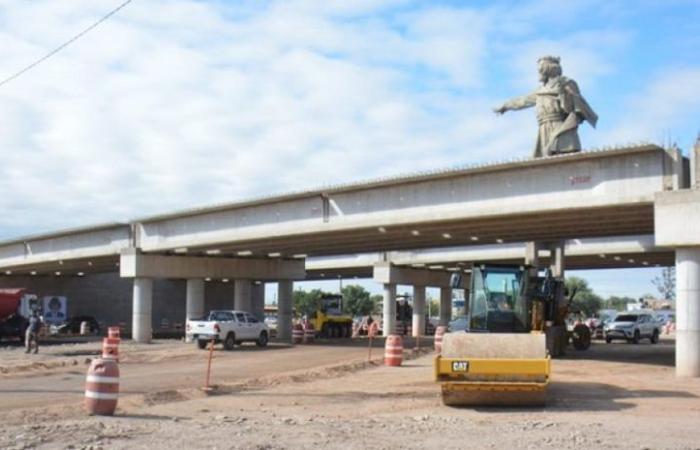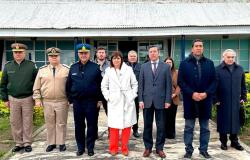June 16
09:47
2024
Print news
Several provinces have already signed agreements with the Nation to reactivate public works and La Rioja has not yet. Will it be signed in the next few days? The meeting that didn’t happen and the one that did happen. What would the provincial State finance and what the Nation? A conflict that crosses the political, the institutional and thousands of jobs.
The provincial government failed to move forward with the signing of the agreement with the national State to reactivate public works in La Rioja. Meanwhile, governments such as those of Catamarca, Córdoba or Entre Ríos signed those same legal and financial ties.
And the fact acquires a special political value when it is taken into account that everything was ready for a meeting between the Chief of Staff, Guillermo Francos, and Governor Ricardo Quintela to take place last Monday at the “Casa Rosada”. But at the last minute the meeting was suspended.
Quintela himself said publicly: “I was also summoned to sign the agreement, but the meeting was suspended without explanations or a new date.” The president went further and added: “I am not sure about the reactivation of national public works.”
Off the microphone, the provincial officials talk about a “boycott” and point directly to the political tandem made up of the national deputy Martín Menem and the official of the general secretary of the presidency “Lule” Menem. “They were the ones who, upon finding out about the meeting, pressured the Governor not to receive him; they did the same thing last December with another meeting,” they maintain in the “Casa de las Tejas.”
While from “La Libertad Avanza La Rioja” when consulted about this issue they denied it and assured: “It is not true, we do not suggest anything, we have nothing to do with this issue.”
There is an element that works in favor of the provincial government. In all cases, these are works financed with national resources and therefore audited by federal agencies. What difference do the works audited in Catamarca have with those carried out in La Rioja? How to administratively and economically justify that the works can be reactivated in Córdoba and not in La Rioja?
If there were acts of corruption or poor administration of resources, the provincial governments have no direct interference in these works and the problems of lack of transparency should be repeated in all provinces. In fact, in many cases the names of the construction companies involved are repeated, which will be able to resume their activity in other provinces and not in La Rioja.
It is true that “La Rotonda del Chacho”, the Camino a Chilecito or the remodeling of the Capital city center did not meet the deadlines originally determined for their completion in the contracts, but it is also true that the same thing happens in other provinces with similar works.
This week on “Riojavirtual Radio” the national senator Fernando Rejal took the conflict up a notch: “Francos is failing to fulfill his duties as a public official as Chief of Staff due to the non-arrival of resources for the Province and is subject to the Province taking action or Legislators can do it, if necessary we will do it in the next sessions. The meeting with the Chief of Staff and the signing of the agreement is essential, I don’t think it will take more than a week.
Meanwhile, the agreement to reactivate public works is now ready to be signed regarding its content.
The main difference with what we have known in recent years is that in terms of housing construction, the national State would stop financing its implementation and would only contribute money for road works that are above 40% or 50% in their level of execution.
That is, the Province should finance with its own resources the completion of the 1,700 houses that were pending. With the exception of the “Procrear Plan”, which would be about 300 housing units that would be completed with national money.
On the other hand – although there was no photo – on Wednesday Governor Ricardo Quintela held a meeting with former President Cristina Fernández. Once again, the role of national representative Hilda Aguirre in maintaining contact with the “Instituto Patria” was key. The meeting was alone between Quintela and Cristina, and although the content was not revealed, it is clear that the political and economic moment was the issue.
In this context, Quintela continues to increase his national visibility in the face of the Peronist internal elections at the end of the year. It is very difficult to predict today how this party process will end: if there will be elections or a unity list, what role Cristina Fernández will end up occupying, and what will happen to the non-Kirchnerist Peronists.
It is a reality that the Governor’s raid through the national media and his presence in Jujuy and Chaco in the last 30 days are signs of the intention to position himself on the national political map.
In that sense, it is clear that the level of mass knowledge of the Governor remains low and that he is not the main reference for Justicialism today. But it is also true that the disbandment caused after the defeat in last November’s ballot left the sector lacking leadership and so Quintela is trying to emerge as an actor to be taken into account, taking advantage of the Peronist orphanhood.
A few days ago it was known that the Basic Basket needed to avoid falling below the poverty line reached 800,000 pesos per month without including the cost of rent.
In this context, thousands of construction workers do not have a job and do not know when they will have one (with the aggravating factor that in these weeks the validity of the unemployment benefit they receive ends), thousands of Riojans cannot pay the rent and know that for now the dream of own housing granted by the State becomes a chimera and sales of cement and iron plummet in the corralones due to the paralysis of public works.
Many years ago Marxism differentiated super structure from structure. In the structure is the real economy, the means of production and work. And in the super structure, politics and all its institutions. Something similar happens in this topic.
The discussion over the public works agreement, the meetings that do occur and those that do not materialize, the half-sanction of the “Bases Law” or the avoidable photos of Rioja mayors who travel to international meetings are all part of the super structure . A thread that today seems very far from the reality of people, work and economic needs.
In the distant ’70s and ’80s, in the game of balls, staying out of the baton was synonymous with losing, today they are staying out of it.many Riojans.
comments






